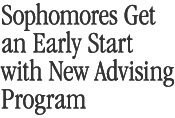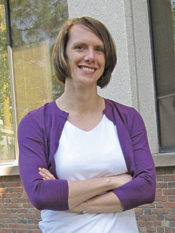
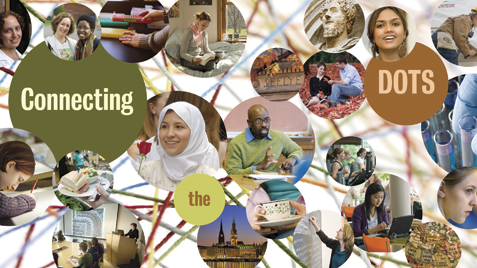
/ NewsSmith, Fall 2009
They fly to Mexico City to interview native filmmakers about the impact of NAFTA. They spend seven months on Capital Hill examining the implementation of public policy. They attend a meeting of the American Psychological Association in Toronto and present a poster session on global peace. They teach schoolchildren in San Pedro, Belize, about coral reef ecology.
They are not journalists on assignment or young lobbyists or practicing teachers and psychologists. These are the Smith College undergraduates—from all walks of campus, from science and engineering to the arts and social sciences—whose scholarly work can be used as the foundation for customized and Smith-supported off-campus study-away experiences.
The intellectually adventurous Smith student sees the campus not as a cloistered academic world but as her base camp for many intellectual explorations. Her learning, as it moves from one semester to the next, takes all forms—classroom-based, theoretical, applied, experiential, domestic and global—and Smith is invested in helping her connect the dots and reveal the big picture.
Irrepressibly resourceful, Amelia Mitchell '11 of Plymouth, Massachusetts, says the abundance of off-campus opportunities was part of what drew her to Smith. And it wasn't long after settling in on campus in her first year that she found her fellow students and professors to be good sources for a variety of off-campus opportunities that she might want to pursue.
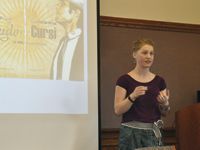
Three months after she heard about international travel grants available to Smith students, Amelia Mitchell '11 was in Mexico City interviewing filmmakers for a research project.
When a friend told her about international experience grants available through Smith's Office for International Study, she researched them quickly on the Smith Web site, shot her adviser an e-mail, met with her the next day, and within the week Mitchell had put together a proposal and budget for a trip to Mexico.
"Three months later I was in Mexico City interviewing film directors and producers about their work and seeing firsthand the impact of the North American Free Trade Agreement (NAFTA) on filmmaking—what I'd been researching from the Smith campus for the previous year and a half," she says.
In fact, her two-year project with assistant professor Mariá Helena Rueda of the Spanish and Portuguese department focused on film and explored cultural rights and the effect of NAFTA and other trade agreements on Latin America.
In all, Mitchell has had quite a few unique study-away experiences. In summer 2008 she was in Paraguay implementing a project she designed for children of a rural indigenous community with a $10,000 grant from 100 Projects for Peace. She taught children, aged 5 to 17, from a small western village how to use cameras to document their lives. When she returned to Smith in the fall, she presented in Nolen Arts Lounge an exhibit of the schoolchildren's work, "Children's Photovoice Project in Paraguay."
This past summer, Mitchell, a government major interested in U.S. foreign policy in Latin America, was studying in Washington, D.C., with Smith's Picker Semester-in-Washington Program, which lasts until December. She also filled her after-hours time with the responsibilities of an internship with the advocacy group School of the Americas Watch.
"Being a Smith student inevitably involves being adventurous and curious in the pursuit of knowledge and higher learning," she says. "I think the wonderful thing about Smith is that there are probably more grants, programs and projects that I've yet to hear about, and so in that sense, I don't think I'm done figuring out all the off-campus learning opportunities Smith has available."
Studying Away
Although students get quite attached to their campus and professors, close to 50 percent of Smith's student body spend time studying away from campus before graduation. As for its study-abroad programs, the college sends more students to other countries for full academic-year programs than does any other baccalaureate institution in the U.S., according to statistics from the Open Doors 2007 Report on International Education Exchange, an annual survey produced by the Institute of International Education.
While a direct measure of how many students pursue the other off-campus learning experiences is not available, the numbers of Smith undergraduates cutting their teeth on an array of global experiences appears to be on the rise.
Some seek out professional internships or enlist in community service projects in far-flung locations for January interterm or the summer. Others head off on two- or three-week faculty-led education experiences overseas or chose the study-abroad experience for a semester or a year in Smith-approved programs. Still others conduct research or independent field study in countries and in areas of intellectual inquiry that intrigue them.
Smith encourages each undergraduate to explore her interests and passions. She does this using the open curriculum to customize, with the help of faculty advisers, her own curricular plan and pair her course work with innovative programs and study-away opportunities.
A study abroad year in Switzerland made all the difference for Amy Tachco '96, who is now in her eighth year with the foreign service and her second year of a two-year assignment with the U.S. Embassy in Beirut. "My junior year in Geneva was critical," she says. "I wouldn't have become so entrenched and enthralled by public diplomacy in the international world if it weren't for that experience."
She adds, "This career path in the foreign service was definitely something I had in mind."
A summer internship at the International Labour Organization, an agency of the United Nations, confirmed her natural aptitude for the global experience. Tachco later returned to Geneva to get her master's in international economics at the Graduate Institute of International Studies.
Virtually every academic and extracurricular experience Lauren Wolfe '05 had as a Smith undergraduate seemed to have been connected, one influencing the next.
"While I was at Smith I just kept pursuing what I was interested in and took the opportunities as they came—and they have played a huge part in all the opportunities I have had since graduation," says Wolfe, who recently earned her law degree from Detroit Mercy Law School and took the Michigan bar. Within weeks she moved to Washington, D.C., to take a new job with the Truman National Security Project to engage U.S. veterans in the upcoming climate change legislation.
In many ways, Wolfe has been honing her skills since she was an undergraduate. As a student speaker at her 2005 commencement, she recalled how Smith had challenged her the most outside the classroom, and she suggested that Smith students should look for more of those kinds of experiences.
"I joined a lot of extracurriculars at Smith," she says, "from Wilson House to College Dems and a few things in between, and through those activities I learned the importance of listening, communicating and advocating on behalf of others. Those skills treated me well after Smith at law school and certainly while working on political causes."
While serving as president of the Smith College Democrats as an undergraduate, Wolfe was elected president of the College Democrats of Massachusetts. In addition, she held internships with the Democratic National Committee, the Dean for America campaign and Senator Carl Levin and spent the year after graduation teaching English in Germany on a Fulbright scholarship. Upon her return to the U.S., she joined the leadership team of the national College Democrats of America and in 2006 was elected president of the organization. That position brought her membership in the Democratic National Committee, which led to Wolfe becoming the youngest female superdelegate from Michigan to the 2008 Democratic convention.
"Learning how government works in class is good foundational knowledge, but learning how politics operates firsthand is a totally different experience," Wolfe says. "My work with the Smith College Democrats taught me how to operate as a team, how to join a campaign and how to get involved in politics on a national level."
Making connections to the wider world is a crucial part of the Smith education. To that end, every student has guidance available to help her navigate the open curriculum (which has no requirements other than those of her major and a writing-intensive course) and choose her course work, major and other learning experiences. She is encouraged to seek advice from faculty members, department chairs, student academic advisers and, in her first and second years, her premajor faculty adviser. After declaring a major, she is assigned an academic adviser from the major department or program.
Yet at Smith, advising entails much more than helping students pick out their courses, says Kate Queeney, associate professor of chemistry and director of advising.
"Advising is a way for students to talk to faculty members about following interests and exploring passions," says Queeney. "They can talk about connections between courses and between courses and things they're doing outside the classroom. An adviser can help a student think about how her course plan reflects her larger goals or maybe about how it will help her identify and refine those goals."
Pocketing Skills Gained From a Liberal Arts Education
Helping each student develop a vision for her future is also a responsibility of the counselors at Smith's Career Development Office.
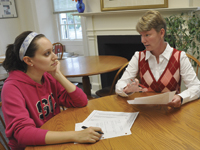
Stacie Haugenbaugh (right), director of the Career Development Office, encourages students to build on—and appreciate—the valuable communication and analytical skills they are gaining from a Smith education. Testing those skills off campus in real-world situations is important as well.
Stacie Hagenbaugh, director of the CDO, observes that a liberal arts education encourages intrinsic curiosity and is dedicated to inquiry and critical examination of information. These elements serve students well, she says, as they take the time to explore academic fields and build skills.
She tells students, "You are honing some valuable skills while you are at Smith, and it's good to know how these skills work in theory in the classroom as well as how they work in the real world. And if you have found opportunities that allow you to test these skills off campus in situations with real people, real politics and real complexities, then you will be able to put these skills in your pocket when you graduate and rely on them for the rest of your life."
Some of the skills Hagenbaugh refers to are reflected in a study by the National Association of Colleges and Employers. According to their 2009 Job Outlook survey, the top five personal qualities and skills employers seek are: communication skills (verbal and written), strong work ethic, teamwork skills, initiative and analytical skills.
"These are the same skills that every industry needs," notes Hagenbaugh.
Amy Tachco, the economic officer with the U.S. Department of State in Beirut, echoes Hagenbaugh's remarks on developing professional skills when she responds to e-mails from Smith students seeking career advice.
"One of the things that strikes me now is that they are very worried about taking the right path. But what I find interesting is that it’s not always a straight trajectory from the classes you take to the career you choose," says Tachco, who had a double major in French literature and economics.
"I didn't take a single political science class while I was at Smith but I do a lot of political analysis now. That ability to take different issues and do critical thinking and cross-cutting analysis across the issues is an example of the importance of developing those types of skills while you are at Smith because you can use them in all kinds of fields."
She adds: "Those of us working at the Beirut embassy are not all PhDs in statistics or natural resources, but here in the Middle East water and electricity and broadband are big issues with implications that fall under [the domain of the] economic portfolio I handle. In jobs like mine you need to have a mindset that is flexible and open enough to deal with issues you may not have seen before."
Flexibility has also played a role in the career of Rachel Honig '93—which is not the one she thought it would be.
It was during a 1992 summer internship in the Metropolitan Museum of Art's legal department that Honig, as a rising Smith senior, decided she was "absolutely going to become a lawyer" and therefore she would major in art history with a minor in ethics.
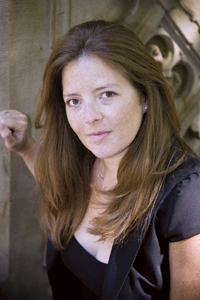
Rachel Honig '93 never got to law school as she had planned; today she is one of four partners in the public relations agency G. S. Schwartz & Co., Inc., and two years ago co-founded a sister agency offering marketing strategies and services for new media and social media networks. Photo by Elizabeth Solaka '93.
But an economic recession in 1993 altered her plans following her graduation, "and I needed a job before graduate school." She interviewed with the New York branch of Sotheby's art auction house and soon found herself responsible for managing the branch's first-ever records inventory and developing software for its archive. That led to an administrative position with the American paintings department at Sotheby's, which in turn led to a position with the New York State Council on the Arts.
Then at the age of 27, Honig landed a job with the public relations agency G. S. Schwartz & Co. Inc. Eleven years later, she is one of four partners who have a share in the firm in addition to the primary owner and founder. Two years ago, she also co-founded Schwartz's sister agency, Digital Power and Light, a business offering marketing strategies and services for new media and social media networks, and is now its chief operating officer.
Not surprisingly, at Smith she gained many of the qualities and skills she relies on today in her profession, she says. For example, the abilities to be an effective public speaker and to articulate a clear message in a very short time were formed during her experiences as a Smith undergraduate serving in student government and as captain of the debate team.
Overall, she adds, the way in which a Smith education prepared her for success in this business "is the quintessential argument for a liberal arts education. It gave me a great foundation for what I do now: my ability to communicate effectively, the ability to listen, analyze and interpret—these things are what I do all day long."
But what of Honig's plans to become a lawyer? "I never got to law school," she remembers from her Park Avenue office in Manhattan, "and I'm pretty okay with that!"
Of course, Honig isn't the only Smith alumna to harness the power of her Smith education to build a successful career.
Geology major Elizabeth Thomas '05 began her doctoral studies in geology at Brown University this September after working as a research technician and getting her master's degree in geology, focusing on the study of past climate change. She cites her experience in the summer 2005 teaching Belizean schoolchildren about reef ecology—with the Smith Coral Reef Ed-ventures Program in San Pedro, administered through the environmental science and policy program—as a key step to what has become a firm path that she set out upon as a Smith undergraduate.
"The experience I gained during Coral Ed...helped me obtain a National Science Foundation graduate research fellowship," Thomas wrote in the 10th anniversary Coral Reef Ed-ventures Program alumnae newsletter this summer. "This funded a year of my master's program and will fund two years of my Ph.D. I will continue to study past climate change, and thanks to the wonderful experience teaching in Belize, I am planning on being part of Brown's active involvement in outreach to local schools."
Good Experience, Useful in the Future
For many students, an internship can build momentum for reflecting on career choices and life after college. Getting a sense of what it's like to be a working professional in New York City was useful for Juliane Casey '11 and Ryan Rasdall '11 who spent the summer working as interns for Dr. Judy Kuriansky '68, clinical psychologist, book author and advice host of radio call-in shows. Their Praxis internship took them all over Manhattan and beyond, from the newsrooms of CNN and Court TV to a classroom in Columbia University Teacher’s College and a professional meeting of psychologists in Toronto.
"This internship has been beyond my expectations," says Casey, a psychology major with a minor in economics. The summer spent with Kuriansky, who is often referred to as simply "Dr. Judy," was "eye-opening," she says. She and Rasdall assisted Dr. Judy with projects that included psychology research, peace advocacy work at the United Nations, teaching a graduate course, Psychology of Human Intimacy, at Teacher's College and managing Dr. Judy's guest appearances on radio talk shows and cable news networks.
"What I especially liked about this amazing experience," says Casey, "was meeting other Smith alumnae working in the city, and I've learned that the Smith network really does exist. There is a strong bond among all Smith women that I wasn't so aware of before."
Rasdall, who is majoring in women and gender studies with a minor in Afro-American studies, says she is proud of the paper she and Kuriansky co-authored, "Sexuality Education: What Medical Practitioners Need to Know for Improved Doctor-Patient Communication," written for the International Society for Sexual Medicine.
This semester, Ryan is in Amsterdam studying international perspectives on sexuality and gender through a School for International Training program. At Smith, she co-heads the student organization Peer Sexuality Educators and is thinking about attending graduate school for a master's in human sexuality. The internship has strengthened her intentions.
As the summer ended and she packed for the Netherlands, Ryan was reflective. "Last summer I worked at a restaurant. And this summer, oh my gosh! It's been so different. We had a great time. I did a lot of work. I learned a lot, and I've had a blast."













